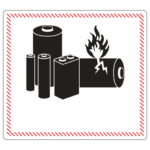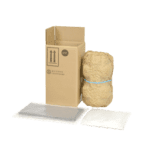 Storing Lithium Batteries: Possible Hazards and How to Mitigate Them
Storing Lithium Batteries: Possible Hazards and How to Mitigate Them
Lithium batteries are components in many electronic devices ranging from cell phones to electric vehicles. Lithium-ion batteries are very useful, as they are lightweight, can hold large amounts of energy, and can be recharged quickly. However, storing them improperly can lead to toxic gas generation, which can pose significant harm to human health and cause property damage. In this blog post, we’ll discuss storage considerations for lithium batteries, possible hazards, and ways to mitigate against them.
Possible hazards of lithium-ion batteries
Toxic gas generation is one of the most significant hazards associated with lithium batteries. When a lithium battery is damaged or charged or discharged beyond the recommended limits, it can produce hydrogen, oxygen, and carbon dioxide gases. These gases can build up inside a confined space where the battery is being stored, such as a closet, cabinet, or room. If the concentration of these gases exceeds a certain level, it can lead to an explosion or fire causing serious physical harm or property loss. To mitigate these hazards, it is crucial to store lithium batteries in a safe place and observe the recommended storage guidelines.
Storage Considerations
The following are some considerations to keep in mind when storing lithium batteries:
- Never store a damaged, defective, or punctured battery.
- Avoid storing lithium batteries in high-temperature environments, such as in direct sunlight, in a hot car, or near a heat source.
- Store lithium batteries in a well-ventilated area as hydrogen gas can accumulate in a confined space.
- Store lithium batteries away from combustible materials such as paper, cardboard, or flammable liquids.
Ways to Mitigate Against Issues
To mitigate against the hazards of lithium batteries, adhere to the following guidelines:
- Use high-quality lithium batteries with built-in protection circuits.
- Charge lithium batteries according to manufacturer recommendations.
- Do not overcharge or discharge lithium batteries beyond what is recommended.
- Use reputable chargers
- Store lithium batteries in fireproof and explosion-proof bags or containers.
Lithium batteries are convenient and helpful components of many electronic devices, but they can generate toxic gases, which can be dangerous for human health and property. It is essential to store lithium-ion batteries in suitable conditions, including a well-ventilated area that is free from combustible materials, away from heat sources, and according to manufacturer recommendations. By following these guidelines, we can avoid potential hazards and use lithium batteries safely.
Do you have questions about Lithium Batteries? Take a look at our Lithium Battery FAQ, or contact our team of experts at 855.734.5469 or send us an email, we’re happy to help.
Stay up to date and sign up for our newsletter!
We have all the products, services and training you need to ensure your staff is properly trained and informed.
 Lithium Battery Mark Lithium Battery Mark |
 Hazard Class 9 Hazard Class 9Lithium Battery Label |
 4GV Securepacc 4GV SecurepaccComplete Shipping Kit |

 Storing Lithium Batteries: Possible Hazards and How to Mitigate Them
Storing Lithium Batteries: Possible Hazards and How to Mitigate Them



